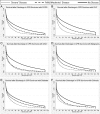Long-term outcomes after in-hospital CPR in older adults with chronic illness
- PMID: 25086252
- PMCID: PMC4219338
- DOI: 10.1378/chest.13-2110
Long-term outcomes after in-hospital CPR in older adults with chronic illness
Abstract
Background: Outcomes after in-hospital CPR in older adults with chronic illness are unclear.
Methods: We examined inpatient Medicare data from 1994 through 2005 to identify CPR recipients. We grouped beneficiaries aged ≥ 67 years by severity of six chronic diseases-COPD, congestive heart failure (CHF), chronic kidney disease (CKD), malignancy, diabetes, and cirrhosis-and investigated survival to discharge, discharge destination, rehospitalizations, and long-term survival.
Results: We identified 358,682 CPR recipients. Most patients with chronic disease were less likely to survive to discharge (eg, 14.8% in the advanced COPD group [P < .001] and 11.3% in the advanced malignancy group [P < .001]) than patients without chronic illness (17.3%). Among discharge survivors, the median long-term survival was shorter in patients with chronic illness (eg, 5.0, 3.5, and 2.8 months in the advanced COPD, malignancy, and cirrhosis groups, respectively; P < .001 for all) than without (26.7 months). Although 7.2% of CPR recipients without chronic disease were discharged home and survived at least 6 months without readmission, ≤ 2.0% of recipients with advanced COPD, CHF, malignancy, and cirrhosis (P < .001 for all) met these criteria. Adjusted analyses confirmed that most subgroups with chronic illness had lower hospital discharge survival, and among discharge survivors, most were discharged home less often, experienced more hospital readmissions, and had worse long-term survival.
Conclusions: Older CPR recipients with any of the six underlying chronic diseases investigated generally have much worse outcomes than CPR recipients without chronic disease. These findings may substantially affect decisions about CPR in patients with chronic illness.
Figures

References
-
- Kouwenhoven WB, Jude JR, Knickerbocker GG. Closed-chest cardiac massage. JAMA. 1960;173(10):1064-1067 - PubMed
-
- Tucker KJ, Savitt MA, Idris A, Redberg RF. Cardiopulmonary resuscitation. Historical perspectives, physiology, and future directions. Arch Intern Med. 1994;154(19):2141-2150 - PubMed
-
- Angus DC, Barnato AE, Linde-Zwirble WT, et al. ; Robert Wood Johnson Foundation ICU End-Of-Life Peer Group. Use of intensive care at the end of life in the United States: an epidemiologic study. Crit Care Med. 2004;32(3):638-643 - PubMed
-
- Schonwetter RS, Walker RM, Kramer DR, Robinson BE. Resuscitation decision making in the elderly: the value of outcome data. J Gen Intern Med. 1993;8(6):295-300 - PubMed
-
- Murphy DJ, Burrows D, Santilli S, et al. . The influence of the probability of survival on patients’ preferences regarding cardiopulmonary resuscitation. N Engl J Med. 1994;330(8):545-549 - PubMed
Publication types
MeSH terms
Grants and funding
LinkOut - more resources
Full Text Sources
Other Literature Sources
Medical
Miscellaneous

